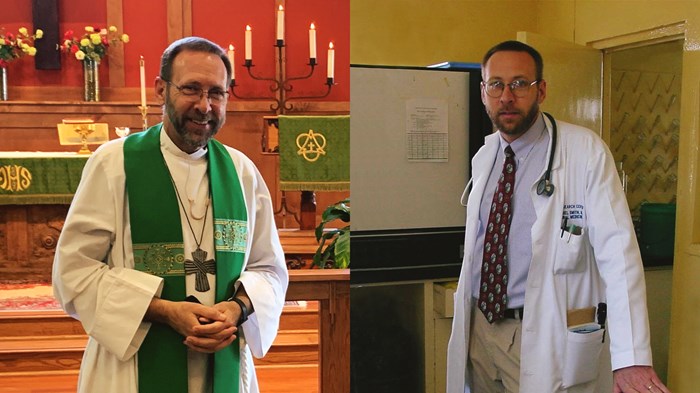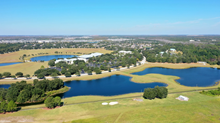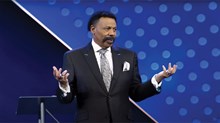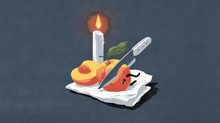
Infectious disease physician Nathaniel Smith took on two new roles during the pandemic: acting director of the Centers for Disease Control and Prevention’s (CDC) Center for Global Health and interim priest of his Anglican church plant.
“My interest in faith and medicine come from the same place: the desire to share Christ’s love in practical, tangible ways,” said Smith, a former medical missionary. “They both flow out of my identity in Christ.”
In his role at the CDC, Smith helps his team identify emerging public health threats in more than 60 countries, run treatment programs for diseases ranging from HIV to measles, and support COVID-19 monitoring and vaccination efforts worldwide.
But the isolation of the pandemic urged him toward greater involvement in his local church. He was ordained as an Anglican priest in 2020 and stepped in as interim priest of Atlanta’s Trinity Northside Parish in 2021.
Smith’s CDC office is situated along the Clifton Corridor in Atlanta, a major hub of education, research, and health care that also houses Emory University and multiple hospitals. And Smith is one of many Atlanta-area Christians working there who have lived out a dual calling during the pandemic, seeking to reduce illness through their clinical knowledge and to proclaim Christ in word and deed.
That task started with a swell of public gratitude at the beginning of the pandemic in 2020 but has grown more difficult over time as public perception toward medical recommendations has shifted. And this provides a central challenge for Christians working in public health and medicine at this stage of the pandemic—how to persevere in their faith while wrestling with their limits and trusting God’s sufficiency.
“This is the hardest time I have ever walked through as a physician, as a hospital administrator, and as a laboratorian,” said Dr. Colleen Kraft, associate chief medical officer at Emory University Hospital in Atlanta. “I don’t know how people come through this experience without having faith.”
Kraft is no stranger to high-stakes medicine. She was on the team of infectious disease doctors who treated the first Ebola patients in the United States in 2014 as an anxious nation watched. Thankfully, those patients recovered, and the hospital’s rigorous protocols prevented the deadly virus from escaping into the community. But the experience of the COVID-19 pandemic has been much different.
Working in hospital administration, Kraft is part of the team that makes sure the hospital can handle the COVID-19 surges. She’s addressing logistics and staffing issues, doing things from tracking down reusable hospital gowns when others are held up in the supply chain to staying late to log samples alongside overwhelmed lab technicians to improve morale.
The intensity of her role during the pandemic has kept her from participating in church activities as much as she used to. “I’m missing the ritual of [church] community,” said Kraft. “Sometimes work can feel like a worship community. We are trying to relieve suffering together, and that is worshipful to me.”
As her job intensified during the pandemic, she found herself going back to basics, revisiting old college worship music and her Experiencing God workbook. “It helps me look out for those ‘it could only be God’ moments,” said Kraft, thinking of the times when an “impossible” administrative obstacle somehow cleared by the end of the day.
Fighting misinformation and COVID fatigue
One key struggle for Christians working in health care and public health during the pandemic has been pushing back against misinformation.
Rose Glass is a founding member of the CDC’s 320-member Christian Fellowship Group, created in 2001 for CDC Christians to worship and pray regularly for the CDC’s work and one another. The Christian Fellowship Group hosts weekly lunchtime prayer and Bible studies and had offered monthly worship services before the pandemic.
As a 34-year veteran of the CDC, Glass has been stunned at the misinformation she has witnessed both from political figures and from faith leaders she once admired.
“These messages that the vaccine will kill you, these conspiracies … It’s madness,” said Glass, an ordained minister in a nondenominational church. “But that is what the Enemy wants us to do, to turn against each other.”
Glass lost a cousin to COVID-19 earlier this year because of lax protocols by family members, despite their knowledge that the cousin was high-risk. “That was a low point for me. Your cousins are your first best friends,” she said. “It was so avoidable.”
Nursing clinician and educator Rachel Blanchard has seen new challenges emerge in later stages of the pandemic. Though the pace of ER admissions has slowed, her Atlanta-area hospital now struggles with staffing shortages and sagging morale as travel nurse incentives encourage rapid turnover.
“We have a sense of ‘When will this end?’” says Blanchard, a mother of three who worships at a Methodist church. “How long can we continually find new staff?”
She is finding the need to relax her instinct to plan for every scenario. “I have to let go of what I cannot control.”
Embracing limits
If any lesson has emerged from the pandemic, it is that we do not control our world as we thought we did.
“We had all sorts of preparedness plans,” said Smith. “But so much didn’t go according to plan.”
Kraft says this reality is ushering her into a new phase of faith. “I’m constantly having more and more things to turn over to God—things that I thought I had control over. It makes me yearn for a place that is not this earth.”
This acknowledgement of limits can lead to deeper, more dependent faith.
Jonathan Yoder, who worked on COVID-19 in addition to his role as deputy chief for waterborne disease prevention at the CDC, describes the upheaval of the past two years: “If [something like] this doesn’t lead you to question your faith, you probably aren’t being honest with yourself.”
He appreciates how the pandemic has underscored the simple reality that life is fragile. And that we all must learn to walk in greater humility.
“There have been missteps and we have a commitment to learn from this and get it right,” said Yoder, a Presbyterian. “We must approach it with transparency and humility.”
But he finds that his ultimate hope in Christ gives him freedom to focus on what is essential. The pandemic has shaken loose a new understanding of the Christian walk. “We often think about being a Christian as doing things to show our faithfulness,” said Yoder. “But that’s not it at all—it’s about how faithful he is to us.”
He was initially drawn toward public health as a tool for the common good, a way of bringing shalom to the world God has made. During the pandemic, he has been reminded of the Hebrews 13 passage that describes how Jesus was sent outside the camp to die a death of isolation, mirroring Israelites with infectious disease in Leviticus who were sent outside the camp.
“He suffered for us and experienced physical and spiritual loss,” said Yoder. “Maybe part of the loss of connection that we experienced during COVID will bring us closer to understanding Christ’s sacrifice for us.”
Lessons from the pandemic
Nathaniel Smith has made multiple adjustments during the pandemic. His family moved from Arkansas, where he worked for the state health department in the early months of the pandemic response, to Atlanta so he could work at the CDC.
As he stepped in as interim priest last year, he learned to fit sermon preparation into evenings and weekends. Leading his 100-person congregation amid the COVID-19 waves was an opportunity to see past political divides and to lean into the person of Jesus, he says.
“We learned to love even as we disagreed,” said Smith. As the world turned upside down, his congregation saw that God was still active and in control.
Smith’s faith deepened further as his wife was diagnosed with stage IV breast cancer during the pandemic. The couple was prompted to reflect on God’s faithfulness through years of grueling, at times perilous, medical missionary service in Kenya.
“We have seen the Lord take us through difficult times in the past,” said Smith, “and he will continue to provide in the future.”
Despite the loss and uncertainty brought by the pandemic and his wife’s diagnosis, Smith finds himself tightly tethered to God, believing that his purposes are beyond our understanding.
“If God can draw me close to him and reveal things that are most true, he can do the same thing in our world,” said Smith. “We can come out of the pandemic with a better way of thinking about each other, the world, and God as the source of life.”

Support Our Work
Subscribe to CT for less than $4.25/month


















